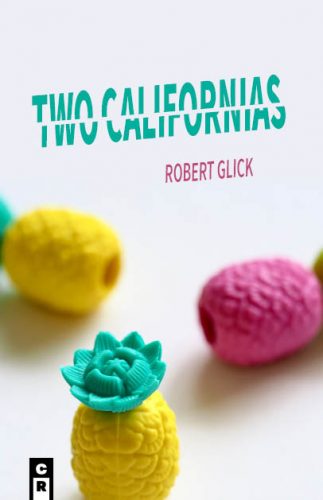Book Review: Robert Glick’s “Two Californias” — An Affinity for Fragmentation
By Vincent Czyz
Two Californias is full of humor, good writing, and thoughtful angles on human existence—with zombies thrown in for good measure.
Two Californias by Robert Glick. C&R Press, 195 pages, $18.

Robert Glick’s Two Californias consists of seven short stories preoccupied with death, decay, disease, fragmentation, dissolution, and failure — concepts linked, perhaps, by the fact that each can be seen as a form of failure. On page one a babysitter makes this Hamletesque observation: “Something’s accelerating, becoming smelly, a cheap slab of meat gone bad.” In “Release,” a professor of “zombie studies” is off to see his dying grandmother a final time and on the way contemplates ad nauseam the walking dead — symbol par excellence of disease, rot, and death. The narrator of “Goat Pharmacy” is “repulsed” by “The saurian eyelids and pinhole memories and unthrottled leakages of old people.” In “Hotel Grand Abyss,” our favorite academician — the only character to appear in more than one story — decides to have his father, who’s suffering from dementia, move in with him. “Maybe I know I can’t take care of him. I need to fail, which will compel him to talk about my failures so I can resent his resentment of the failures I’ve failed to avoid. Or I’m studying him. It’s like having a zombie chained to a fence, limb by limb deteriorating limb off.” In the collection’s only flash fiction, a man named Dizzy reveals with self-conscious bombast a pair of recent arrivals on his body: lesions from AIDS. The final story, “Failure Mechanism,” is pervaded by the dread of HIV and infected needles.
The stories are told in a variety of styles, and Glick shows an exceptionally deft hand with his sentences. He’s meticulous down to individual word choices and, though now and again he doesn’t make the right one, even his misses indicate a lively, fertile mind. Here’s one in which there’s neither imprecision nor a word out of place: “One of the other windows, made not of glass but of Hefty Bag, is sucking the breeze in and out, like an artificial lung the color of oil spill.” You can see that makeshift window, hear the plastic snap back and forth — you’re standing next to it.
The stories are somewhat unconventional, if not in style then in structure, although I’m not sure that always works to the reader’s advantage. The first offering, for example, “In the Room / Memory is /White” (why this title, I have no idea — there’s no specific room; it’s not about memory), begins with the babysitter, Dorian, and it seems she’s the main character (we even hear about her “monkey-fingered” boyfriend), but she’s the least important character. Nor does the story move chronologically, a narrative strategy that resulted in some rereading as I tried to figure out where I was on the story’s timeline. This temporal dislocation happens throughout the fictions, often creating unnecessary confusion and disjointed narratives though it also appeases Glick’s affinity for fragmentation.
The marriage in “In the Room” has been contaminated by an affair Dr. Mulhouse is having and complicated first by his wife’s pregnancy then by an abortion that she wants (citing the other woman), but he resists, hoping for a new start. Their endless fights drive 10-year-old Jacob to scurry for safe spaces, his favorite being under the Jacuzzi cover, and retreat into himself. The ending feels a little unresolved, more like a continuation than a conclusion, and the distance Glick maintains from his characters stunts the emotional impact — he never describes any of them, nor does he use first names with the parents, as if the narrator is peering at them through binoculars or has a formal relationship with them, as the family dentist might. Then again, perhaps this is intentional since Jacob and the warping of his psychology are at the heart of the story.
Samuel R. Delany, riffing on GK Chesterton, has commented that “There are no uninteresting subjects, only uninteresting ways of writing about them.” Glick bears this out. I’m highly allergic to high school kids and adolescent angst, but “Goat Pharmacy,” about a pair of teenage wrestling buddies, gets my vote for best story in the collection. I suppose it helps that I’m an ex-wrestler and their high school music — Dead or Alive, Oingo Boingo, Flock of Seagulls — was my college music, but the story’s aesthetic appeal goes far beyond a little personal resonance. Glick hits the right notes with the dialogue, the slang, the age-appropriate anxieties, schemes, and a pitch-perfect rendering of a first sexual encounter. Donny’s obsession with Japanese culture, the samurai in particular, adds another dimension to him as the story’s protagonist but also offers the reader subtle trail markers.
The boys and Monkeyfur’s girlfriend, Ginny, all work at Gaynor Pharmacy, owned by Goat (nicknames, you may have noticed, abound), an obese alcoholic. Although the climax of the story involves a conspiracy to swipe drugs with street value while Goat’s in an alcohol-induced stupor, “Goat Pharmacy” isn’t about Donny’s refusal to abet his best friend and Ginny or his empathy for Goat, though that is real; it’s about a dysfunctional friendship. Donny is envious of Monkeyfur in almost every way: Monkeyfur is a phenomenal wrestler who placed fourth in the state; Donny can’t even break into the varsity lineup. Monkeyfur is a ladies’ man with a steady girlfriend; Donny is still a virgin; Monkeyfur is confident in everything he does; Donny is plagued by insecurity. More to the point, Donny doesn’t actually like his best friend; he can’t stand his arrogance or that Monkeyfur will “for the billionth time, prove himself immune to consequences” (re: the drug heist Goat is snoring through). And this is largely what makes it a good story: to become his own person, Donny has to give up Monkeyfur’s affection, protection, and friendship as well as openly betray him (he’s already secretly betrayed him with Ginny).

Author Robert Glick. Photo: C&R Press.
“Mermaid Anatomy,” the most ambitious of the stories, and the most difficult to read, has the best — and worst — writing in the collection. And by worst, I don’t mean it’s bad; I mean it sometimes keeps running after it’s crossed the finish line. For example, instead of a functional description of an old shipwreck exposed by low tide, we get “The ship unentombed unlike the cretaciously ambered bugs Lena wore on long chains around her neck.” For one thing, I see the amber-locked insects instead of the wreck. For another “unentombed” and “unlike” are at cross purposes, really. The most banal visuals sometimes work better than lines polished until all that can be seen is shine. But then, a few sentences later, when Lena comes across the remains of a bonfire, Glick writes, “Her boot whispered everything to ash.” While glorious sentences such as this easily outnumber the ones that wander into the overwrought, the story has other issues: Lena, for example, likes to throw out quotes made popular by Situationist International — a movement that fascinates me — but to a purpose so vague they feel like non sequiturs.
The plot, such as it is, concerns a Dutch 20-something — and I’m guessing; no ages are mentioned — infatuated with Lena, whom he meets while staying at a California youth hostel where she works. After their excursion to the shipwreck, he goes along with a plan she cooks up to behead a mermaid statue with a chainsaw. The problem is that the narrative bounces around so much, between distant past, recent past, and present, between Holland and California, I had a hard time keeping track of what was happening when and what exactly was going on. Add to this Glick’s habit of not describing characters beyond a single feature, like Monkeyfur’s hairiness, or much in the way of physical setting, and you may feel a bit untethered among skeins of long sentences skimpy on punctuation:
Making swimming motions her arms parting the air as if its very consistency lightened before her and in her I saw the arrhythmic line of my lost days no longer lashed to me and the box of atrophy I had long secured around me in freefall like an open-walled construction elevator whose cable had been cut.
“Failure Mechanism,” the longest story in the collection—at 80 pages, a novella really—is the last, and I was relieved to find it was far more accessibly written than “Mermaid,” but, as ever, Glick confuses from page one:
Much later
Kirby will push Trish down the stairs.
Bean will be walking down Telegraph [Avenue].
Who’s Trish? Who’s Kirby? How are they related to Bean? Who’s Bean? Why are we starting with something in the distant future? I’m game for disorientation, but it was many pages later and more characters added to the cast — Cynthia, Callie, Dave — before I understood Trish is Bean’s roommate but not his girlfriend (that’s Cynthia though Callie, who likely started out as a romantic interest, also lives with them), while Kirby is Trish’s boyfriend. As a reader, I gravitate toward the heterodox, toward stories that go in through the out door, and I’m at home in a universe adrift on field of quantum flux, but there’s no reason Glick can’t have this opening and a bit more clarity as well. That said, I’m not sure the story justifies its length or that the concept of a failure mechanism, “the physical, chemical, or other processes that result in failure,” isn’t to some extent being misapplied. Moreover, despite the impressive page count, the characters feel sketched rather than drawn.
Essentially, Bean is inflamed with unchanneled rage, partly because he just lost his father to cancer, but his anger goes deeper than that (his father had his own carefully concealed rage issues). It undermines his relationship with Cynthia, his friendships with Trish and Callie, as well as his performance at work — so what’s left, really? — and while I found the final section engaging and lyrical, it seems to go with a different story, or at least with a different character.
If I haven’t been clear about the net result of reading these stories (violating my own stipulation), let me say that, while flawed, Two Californias is full of humor, good writing, and thoughtful angles on human existence — with zombies thrown in for good measure.
Vince Czyz is the author of The Christos Mosaic, a novel, and Adrift in a Vanishing City, a collection of short fiction. He is the recipient of the Faulkner Prize for Short Fiction and two NJ Arts Council fellowships. The 2011 Capote Fellow, his work has appeared in many publications, including New England Review, Shenandoah, AGNI, The Massachusetts Review, Georgetown Review, Quiddity, Tampa Review, Boston Review, and Louisiana Literature.
